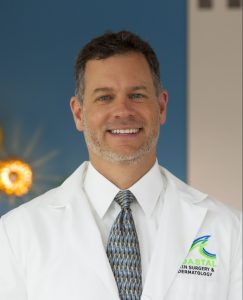Larry Weidell, PA-C | FAQs

Larry Weidell has specialized in dermatology since 2005 and has a passion for general medical dermatology as well as the general well being of his patients. Larry has been a part of Coastal Skin Surgery & Dermatology since 2011 when he relocated with his family from Minnesota.
Practicing primarily in the Miramar/Destin office location, Larry offers a variety of dermatological services including general medical dermatology, management and treatment of skin conditions, and as well as non-surgical and surgical treatments to patients of all ages.
Discover some of the most frequently asked questions by patients like you, provided by Larry Weidell of Coastal Skin Surgery and Dermatology.
Q. What is a PA?
A. A PA (Physician Assistant) is a nationally certified and state-licensed medical professional. PAs are re-certified on an ongoing basis through national standardized exams and maintain stringent continuing medical education requirements. PAs are not medical assistants, nor are they studying to become doctors – they are licensed and certified health care professionals who practice medicine in partnership with physicians and bring a broad base of knowledge and skills to patient-centered care.
Q. How can I treat my “hormonal acne?”
A. Hormonally associated acne can be a stubborn and troublesome problem. This type of acne often occurs around the mouth and along the jaw line, fluctuates around the menstrual cycle, can cause painful cysts, and may lead to scarring. Fortunately, we have both commonly prescribed as well as off-label appropriate, yet creative prescription options to meet the needs of the most challenging hormonal acne scenarios. We also offer aesthetic services through our medical spa as an alternative to or in conjunction with medical acne treatment. Our aesthetician will be in close communication with your provider to insure your acne is thoroughly addressed with a team approach.
Q. What options do I have for my persistent acne?
A. We use a personalized plan that evaluates past and present acne treatment experience. Sometimes, minor adjustments are required and in other cases, substantial treatment changes are best. However, when first and second line therapies do not resolve persistent acne, it can be very discouraging. Depending on the age of the patient, causation, patient preference, and other factors, there are a host of therapy options, even for the most severe and persistent cases. One option is Isotretinoin, a retinoid that is chemically linked to Vitamin A. This treatment can be extremely helpful for severe recalcitrant nodular acne. This medication requires monthly follow up and is prescribed over an extended period (usually months) of time. It is not appropriate for everyone with acne and this medication should be reviewed in detail with your provider for more information.
Q. If a mole is raised, is there something wrong with it?
A. Although a raised mole can have abnormal features, whether a mole is flat or raised is not a distinct feature of abnormal moles.
Q. What do I look for in moles that may be abnormal?
A. We often refer to the ABCDE approach to moles that may be abnormal where A = Asymmetry, B = Borders (irregular or poorly defined), C = Color (for example, variability/very dark/brown/black/red/white or blue), D = Diameter (approximately 6 mm or greater), and E (Evolving). This is a brief but not exhaustive explanation of this helpful way to think about your moles and whether they should have further evaluation.
Q. What SPF number should I be using?
A. The American Academy of Dermatology recommends SPF (sun protection factor) of at least 30 SPF. It is important to look for both UVB SPF as well as UVA ingredients that offer protection in your sunscreen. Your best sunscreen is the one you will use and the choice you are most comfortable with.

